Merry ______mas

It happened a week ago. We were in Canada to visit Valerie’s mom and to be with her for the annual Christmas party at Bevan Village where she lives. (And yes, they do still call it a Christmas party.) There was a gentleman there whose role was to provide Christmas music during the meal. I’m dad to a musician, so I know that singing and playing to a crowd of people who are making more noise than you are might not be the easiest thing in the world. Perhaps that’s why I tried to listen as I ate. The first song was I Saw Mommy Kissing Santa Claus. I looked around, but nobody seemed interested in kissing Santa. Frosty the Snowman was next, and in fairness we did get a bit of snow the next day. After Rudolph his attention turned to bells: Jingle Bells and Silver Bells. I began to wonder if he actually knew any real Christmas carols. The first song that came close to recognizing that Christmas might be about the birth of someone special was Little Drummer Boy, and that was done as an instrumental without any lyrics.
Nobody else seemed to notice in spite of the fact that the same space we occupied is used several days a week by people singing hymns. Don’t get me wrong; I’m not against the popular trappings of Christmas. We’ve cut and decorated a tree, we still send Christmas cards, and we do some Christmas shopping. I even went to the mall on Black Friday. Twice (but that’s another story....) The trappings of Christmas are fun and good -- until they crowd out the one whose birth we celebrate.
It probably shouldn’t surprise me to discover how easily I can accept the secularization of Christmas; I have, after all, lived through plenty of Decembers. But I don’t want to look back on this one with the nagging feeling that something was missing. This year I want for me - and for you - a merry CHRISTmas.
Choosing Blessing

I'm blaming Robert Frost for my current train of thought. This is the time of the year when I find myself thinking about choices. It is not that other seasons require fewer or less significant choices, but the vivid changes of fall provide an appropriate backdrop to considering the choices one makes. I have little in common with Robert Frost, but I had to memorize his poem in school too many years ago. You might remember it as well, the one about two roads diverged in a yellow wood.... It's probably Robert Frost's fault.
I'm pretty much happy with the choices I have made, even though some of them were painful. If you have lived long enough, you will have discovered that some choices bring unavoidable pain, perhaps to yourself, perhaps to others. Just about everyone in my generation has made such choices, and some of us are bold enough to admit it. But a painful choice is not necessarily a bad one. (A mundane example: We recently decided to sign up with a nearby fitness center. It is a decision bound to cause some discomfort, but it is a good decision; some pain is worth it.)
I live in an age when the strong temptation is to choose the road of least pain. Well-meaning but occasionally misguided friends encourage that choice. It is a well-worn path, and sometimes it is a good one, but not always. I have come to enough forks in the road to have figured out that the road of least pain is often not the path of greatest blessing. And since I have to choose, blessing is better. Walking through the valley with the One who knows the way has got to beat trying to avoid the valley without him!
So maybe Robert Frost and I do have something in common. When I come to those points where two roads diverge in a yellow wood, I'm likely to make the same choice he did:
Two roads diverged in a wood, and I --
I took the one less traveled by,
And that has made all the difference.
Being Heavenly-Minded
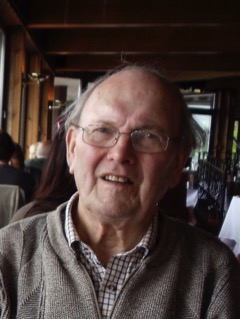
Ted achieved that status 25 years ago when my dad passed away in Scotland at the end of a wonderful anniversary trip. My brothers and I were thousands of miles away, but Ted was on site and came alongside my mother, helping to care for the necessary arrangements until I could get there just barely in time for the memorial service. Though we didn't see each other often, I will miss him, and his death has me thinking again about what is and what will be.
Such thinking, I have decided, is healthy in spite of the fact that it may be rare. My train of thought was pushed further along the track this morning when I came across a quote from C. S. Lewis (Mere Christianity) who observed that "the Christians who did most for the present world were just those who thought most of the next." It is an observation that flies in the face of contemporary wisdom. It is a difficult truth that I cannot fully know heaven until I get there; whatever it will be, it will be better than I can imagine. But even with an incomplete and imperfect knowledge, focusing on what will be makes me more effective in handling what is.
I don't much like funerals, but they have an undeniable value for me whether I actually attend them or not. They confront me with the need to think about what will be and not just about what is. Lewis went on to say, "It is since Christians have largely ceased to think of the other world that they have become so ineffective in this. Aim at heaven and you will get earth thrown in; aim at earth and you will get neither.
He was right. Lord, keep me aimed at heaven.
Change

She has been navigating change for 95 years. Though it may seem that she deserves a break, the reality is that as long as God continues to give her days, she will be challenged by change. It's likely that more changes are just around the corner for her.
And for us, too. In the normal course of events, we will one day hear that she has moved to her heavenly home from which there will be no more moves. For her it will be a most welcome change; she has repeatedly told us she is ready for the Lord to take her. For us, left in an imperfect world, it will be one more change to navigate, and one more reminder to anchor ourselves to the One who doesn't change -- and doesn't need to.
Borderlands

On May 6 I married a Canadian. Our travels back and forth across the border give us plenty of opportunities to notice some of the cultural differences between these two children of a common mother. Let me point out a couple of examples. Val believes drivers on the US side are a bit more conservative than Canadians, and I have to agree. For several years I have maintained that the most dangerous drivers on I-5 in Washington are Canadian truckers. It sometimes seems to me that defensive driving is a concept that has never caught on in Canada. I think I understand why her car insurance is almost twice what mine is.
Spelling is an adventure north of the border. The Britishisms that were lost long ago south of the border remain entrenched on the Canadian side. Canadians write cheques instead of checks and might visit a civic centre to attend some colourful programme. Even as I write, my US English spell-check wants to correct these Canadianisms. To further confuse matters, everything appears in two languages, English and French, in spite of the fact that I have yet to meet anyone in Abbotsford for whom French is the primary language.
It's hard to find a store that doesn't sell bags and/or require a 25 cent deposit to use a shopping cart in Abbotsford. (In fairness, some Seattle stores have started charging for paper bags since the city in its unfathomable wisdom banned the plastic ones.) Charging for shopping bags seems to me to be akin to a restaurant adding a plate rental fee to the cost of meal.
Like most other nations both of these siblings are proud of what they are, sometimes to the point of fierce sibling rivalry that would make one question the accuracy of the Peace Arch's inscription. Occasionally we notice that when we cross the border. But we are blessed to belong to two nations that, at least for the time being, let us call them home.
What are some of the differences you have noticed between these two sibling nations??
Wearing Purple
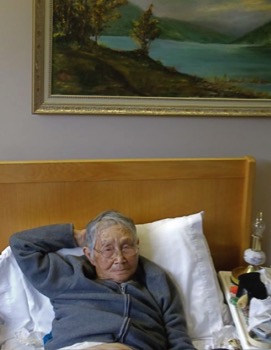
When I am an old woman I shall wear purple
With a red hat which doesn't go, and doesn't suit me.
And I shall spend my pension on brandy and summer gloves
And satin sandals, and say we've no money for butter.
I shall sit down on the pavement when I'm tired
And gobble up samples in shops and press alarm bells
And run my stick along the public railings
And make up for the sobriety of my youth.
I shall go out in my slippers in the rain
And pick flowers in other people's gardens
And learn to spit....
Evie is a delightful lady who has apparently lived way beyond intimidation for years. She has outlived three husbands and shared with Val one of her secrets of married bliss: She just threw things at her husbands when they got out of line. "I used to play baseball," she explained. "I was the pitcher. I wasn't going to put up with his complaining, so I threw the whole dish of macaroni and cheese at him. It hit the wall, and as we watched the mess dribbling down to the floor, we both began to laugh. He asked me what was for supper now, and I told him to get a spoon. But I never held a grudge." I hoped fervently that if Val was learning anything from her example it would be the no grudge part.
You can wear terrible shirts and grow more fat
And eat three pounds of sausages at a go
Or only bread and pickle for a week
And hoard pens and pencils and beermats and things in boxes....
Earlier we had been with Val's mother, Hama. She is a very small and soft-spoken woman who likes to smuggle food back into her room. She was talking about writing letters, and suggesting (again) that she should move back home at the end of the month, a recurring theme when we visit in spite of its impossibility. I picked up on the writing theme and suggested she write the story of her life. She looked at me, and with more verbal energy than we had heard that day, began her story with "We went to the shit house." I almost fell off my chair, but she was dead serious and went on to describe the classic but unintended use of Eaton's Catalogue as a forerunner to Charmin.
But now we must have clothes that keep us dry
And pay our rent and not swear in the street
And set a good example for the children.
We must have friends to dinner and read the papers....
I know I'm a bit less inhibited than I used to be. Maybe this Father's Day I need to ask Suzanne just how close I am to wearing purple with a red hat that doesn't go. I'm pretty sure that Evie and Hama could both get away with most of the stuff in Jenny Joseph's poem. At least they can if we're not looking - and listening. But I sense that I need to look and listen, and maybe you do, too. Because hiding somewhere beyond the purple dresses and red hats and expert spitting, Evie and Hama and their generation have a wealth worth sharing.
But maybe I ought to practice a little now?
So people who know me are not too shocked and surprised
When suddenly I am old, and start to wear purple.
Want to practice with me?
The Trouble with Snow

But it can be a treacherous beauty. I have seen the power of snow to incapacitate all kinds of things dreamed up by human genius. Including our schedules. And I have a healthy respect for the power of what God creates. I personally have no trouble avoiding skis and snowboards; my feet are big enough and flat enough as it is. I have outgrown my need to prove that I can navigate ice. The truth is I like my snow at a distance. And when it gets too close for comfort, I remind myself that sooner or later, it will melt. Because that’s the way God made it.
2012

Wondering about when the world will end may make for interesting conversation, but it strikes me as a bit presumptuous. It presumes that we have - and are entitled to - more time than the present moment. But the present is all the time we ever have. Since the only time that is certain is the moment I currently have, it behooves me to use it wisely and to enjoy the One who gave it to me.
Sometimes I have welcomed the new year with a particular passage of scripture to help focus each moment that God gives. This year I’ve turned to Psalm 31. The same song in which David declares, “My times are in your hands” includes these encouraging words:
How great is your goodness
which you have stored up for those who fear you,
which you bestow in the sight of men
on those who take refuge in you.
My expectation and my hope this year has nothing to do with the Mayans. Each moment this year, I want to enjoy God’s great goodness.![]()
Ebenezer
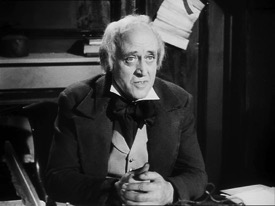
It should go without saying that Christmas is not about lights, shopping, Santa, Rudolph, the Grinch, Elf, Frosty, trees, or even Scrooge or Charlie Brown. It’s about Jesus. But much of the culture in which I live has lost sight of that reality. And sometimes I can, too. I need an occasional ebenezer, a stone of remembrance that points me to the Who of Christmas.
Each year I need to discover afresh the staggering magnitude of the miracle of the incarnation. God becoming flesh; the Creator stepping into creation. And I need to remember why. I’m thankful for the ebenezers that serve to remind me of the reality beyond the tinsel.
Whatever your ebenezer, I hope you are looking beyond it to the Christ who is at the center of a truly happy Christmas.
Solitude vs Aloneness
Solitude is good. I value it. I know that I need time, spaces in my schedule, when I can step back from the normal rhythm and routine of life to gain perspective and to listen to God. Years ago I started to deliberately insert such times into my life, and they have been of great value. It’s hard to do because there are always other people who own part of our schedule, or who think they do. (Maybe they just rent it.) Times of solitude have helped prepare me for life’s surprises, the ones that bring joy and the ones that bring pain. And the ones that bring both.
Aloneness is not good. For much of my life I have successfully avoided it. Perhaps there is a better word for it than aloneness - disconnectedness perhaps? I’m convinced that we were created for relationship - with God and with other people. Aloneness seems to me to be something other than God’s design. And yet there are some people who seem to enjoy it or who manage to transform it into solitude.
Solitude enhances relationship; aloneness destroys it. I suppose it is a delicate dance to embrace solitude without also embracing aloneness. I’m pretty sure I’m not done processing the difference, so feedback is particularly welcome. What do you think?
10 Years Later...

A painful decade later I face the question, how has 9/11 altered your life? Some of the answers are obvious; when I fly I get to the airport a lot earlier. Others are less obvious but more significant. It is harder to ignore how indescribably evil sin is. To celebrate the wanton loss of innocent life for the sake of a lie is hard for me to fathom. That’s the bad news, but there is a good news side to it as well. If I begin to grasp how awful evil is, then I also begin to explore the unreachable depths of God’s grace, a grace that is greater than the awfulness of sin - even the awfulness of 9/11.
Evil has not diminished. The world is no better than it was ten years ago; it is still a mess. But God is not diminished either. And until I trade in this world for the next, I choose to rest in His unfailing love.
99%
Unfortunately for me, she experienced a few days when she had trouble finishing well. The first day, for example, she waited until I was quarter of a mile beyond my hosts before telling me with undeserved confidence, “You have arrived.” I had actually arrived a few moments earlier, but apparently neither of us noticed.
I hoped it was a momentary aberration not to be repeated. After all, she had been accurate all day (granted that was when I actually knew where I was going and didn’t need her directions). However, she was not done playing with my mind. The second day she wanted me to arrive via the street behind where I was to stay. I’m pretty sure there was no “climb over the back wall” option on the GPS, but she seemed to think it would be a good idea. Then there was the day she announced, “When possible make a legal u-turn” while I was driving down the freeway.
On the way home I planned to spend a night at the Super 8 in Crescent City, a destination supposedly known to Maggie. I had forgiven her for telling me to make a u-turn on the freeway and was confident she could get us to a place in her memory bank. “You have arrived,” she announced, at the bottom of the hill coming into Crescent City. I looked, but there was nothing - and I mean nothing - on either side of the highway. “In your dreams!” I told her and kept driving. Half a mile further along I found the Super 8 without Maggie’s help. I asked the guy at the desk if they had moved the motel recently. He looked at me like I was crazy.
Maybe my expectations were too high, but I repent of likening my GPS to the Holy Spirit. When it comes to divine guidance, 99% is not good enough. Maggie may fail me; He won’t.
The Pastor
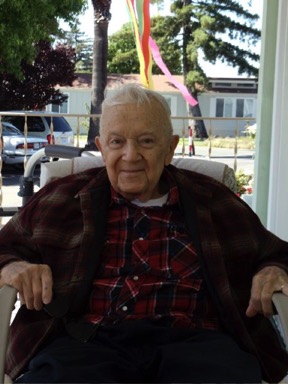
The years have taken their toll as years do, and at 87 my pastor’s painful battle with cancer will probably end sometime soon. But today the mischievous smile was still there as we shared together for over an hour. I prayed for them, planning to take my leave, but we were not finished. He is still the pastor, and once more Pastor Hoyle prayed for me. I am blessed!
A Great Relief?
Death is an easy joke until it hits close to home as it did again this morning when I got word of the death of Joan’s Uncle Al. Death, particularly the death of someone loved and valued, scratches at the scars of previous losses and stirs afresh the strangely familiar strains of grief mingled with joyful memories.
It’s easy to respond to the idea of death being a great relief because we are used to thinking of death in terms of what it is not. For Hepburn, no more interviews. For others, perhaps no more pain. No more disease. No more-- (fill in the blank with your favorite human frustration). But I think that we often look at death backwards.
To be absent from the body (the no more view) is, Paul said, to be present with the Lord. I suppose it is harder, but more helpful, to think of death in positive terms as a great beginning rather than as a great relief. Doing so does not lessen the loss or end the grief, but it helps me understand a little more clearly what Paul’s words mean about the loved ones I have lost. Al’s experience (and Matt’s, Joan’s, and every other believer who has died) is best described not in terms of absence, but of presence. Great relief does not do justice to finding oneself in the presence of the infinitely holy and unconditionally loving Savior.
Death, Katharine, is far more than a great relief!
Your Church is Too...
Several days ago I was enjoying a conversation with a number of other pastors where the question was posed, what IS a healthy church? While the question stimulated some discussion, I don’t recall that it was ever actually answered. My denomination has attempted an answer with a list of ten “leading indicators” of church health, but the list doesn’t quite do it for me, perhaps a reflection of the fact that I am not and have never aspired to be a denominational executive.
The trouble with church health discussions is that they inevitably seem to lead to the feeling that my church is too (fill in the blank). And most of the time there is a great gulf between the feeling and fact. I am convinced that many churches suffer unnecessarily from an ecclesiological inferiority complex, the result of hearing what is too often a great lie that they are too something or not enough something else. The problem arises for a couple of reasons. First, people have confused the church (the body of Christ that includes all believers) with a particular local congregation and wrongly assumed that the local congregation should be everything that the church universal is called to be and do. When Jesus said “I will build my church,” he wasn’t talking about merely your congregation. Second (and more critically), people have focused more on the local expression of the church than they have on the Lord of the church. If you believe your church is too something, could it be because you have become distanced from its Head?
A staggering number of American pastors believe that their congregation is too small. What is more often true is that their view of the church is too small. Wherever God’s people gather, there is his church, and whether it be two or two thousand and whatever the form may be, if the Lord is worshipped, he is pleased.
Heresy Loses
The problems are many and pervasive. Perhaps none are more significant than the diminishing of the character of God. I will leave it to other reviewers to flesh out the details of Bell’s errant convictions that heaven, hell, and God are somehow less than you thought. (Kevin DeYoung’s review is as good a place to start as any.) I’ll be reluctantly taking the book back to the library. I’m afraid if I burned it, Bell would claim that it would somehow emerge from the flames redeemed and ready for heaven. I wish some of my Christian brothers didn’t have so much trouble with the truth.
Picking Your Pace

I am not immune to valuing speed or imagining that I can somehow stretch a given block of time to include more than it was ever intended to hold. But in my saner moments I sometimes wonder why fast has become so important and instant so valued. After all, getting there, frustrating though it may sometimes be, ought to be enjoyed. And I wonder how difficult it will be for us western Christians to adjust to heaven where time will not matter. Perhaps it’s a good thing that we will be changed.
God and Bin Laden
I heard the news that Osama bin Laden is dead called through the bathroom door this morning while I was taking a shower in Ireland. By the time I dried off and dressed, I could see the televised images of a joy that I can’t quite share. I can understand the sense of celebration. For the last decade he has been the face of evil and hatred, and he has now received the destiny he chose. But nagging at the back of my mind has been a disquieting question: What does God think about the death of bin Laden?
I do not minimize for a moment the unspeakable value of the lives of those who have died as victims of or warriors in the battle with terror. I also have trouble wrapping my mind around the truth that bin Laden was a man whom God loved and to whom God’s grace was available. To celebrate the irreversible rejection of such love misses the point of who God is and what He intends. Death, even the death of one who seemed to delight in being the personification of evil, is no win; in the economy of the kingdom of a God who desires that nobody should perish, it seems more like a loss because it was not evil that died; it was an evil man that God had not stopped loving. Bin Laden may be gone, but the battle against evil is not over.
That there are those for whom hell will be needed before they grasp the reality of God is a tragic truth, but probably not one worth celebrating. And if that irritates you, so be it.
Choosing Wisely
That would be the same evening that Suzanne and I discovered an Italian restaurant with some of the best food I have ever tasted. And it was empty. (Technically we didn’t discover it; our hostess recommended it.) Granted the place only seats 15 people, not counting the al fresco option of the outdoor tables, but it seemed strange that such good food should be so widely ignored. “We didn’t know what to expect today,” we were told. “Lunch was busy, but tonight it is very quiet.”
“They don’t know what they are missing,” I told him, and my comment left me pondering: I wonder how often I choose unwisely and don’t know what I’m missing?
Total Gain!
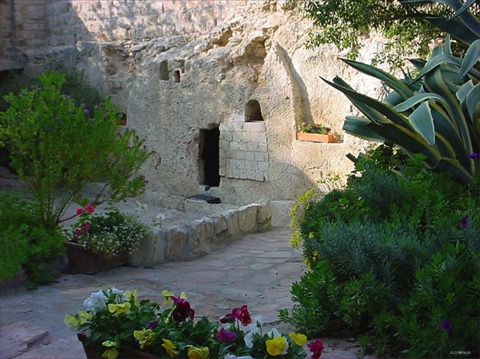
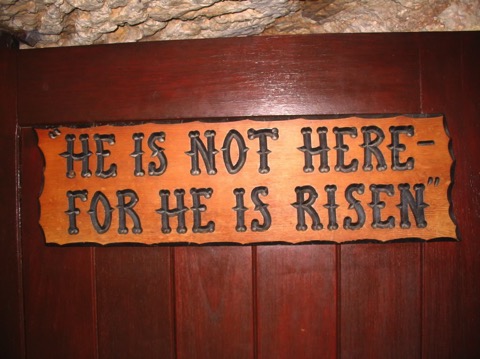
Total Loss?
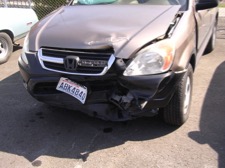
Total loss. The words seem at first to fit the day if all one sees is today. And I readily admit that there are days when the loss of a son feels very total. It must have seemed that way to another Father and another Son who will never recover from Calvary: The resurrected Lamb that John saw in Revelation looked as if it had been slain, the wounds and effects of the cross carried into eternity.
I look beyond the grave on this Good Friday, and I know that death does not win - even when it feels like it does. The message of Good Friday is not total loss; it is Total Gain.
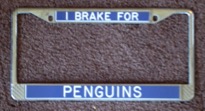
The Beams Are Creaking
Bonhoeffer was a pastor in 1930s Germany who chose truth in the face of the rampant self-deception of the Nazis who attempted to silence him. I’m not sure I would have carried that choice as far as he did, to the point of participating in a plot to assassinate Hitler. But I left the play wondering what kind of pastor I might have been if God had placed me in a different time and place.
“Being a Christian,” Bonhoeffer said, “is less about cautiously avoiding sin than about courageously and actively doing God’s will.” I suppose it is much easier to affirm that statement when the times call for neither caution nor courage than when evil is so readily visible.
The play closes with imprisoned Bonhoeffer and others singing Luther’s hymn, A Mighty Fortress Is Our God, as he is about to be taken to Flossenburg concentration camp. There, four short weeks before V-E Day, Bonhoeffer was executed.
And though this world with devils filled should threaten to undo us,
we will not fear, for God hath willed his truth to triumph through us.
The Prince of Darkness grim, we tremble not for him,
his rage we can endure, for lo, his doom is sure;
one little word shall fell him.
That word above all earthly powers, no thanks to them, abideth;
the Spirit and the gifts are ours, through him who with us sideth.
Let goods and kindred go, this mortal life also;
the body they may kill; God’s truth abideth still;
his kingdom is forever.
Ecclesiological Euthanasia
Not everybody appreciates the variety. Many folks (especially we pastors) have well-formed (and occasionally too rigidly defined) ideas of what constitutes a local congregation. Those that don’t measure up should be transformed or closed. Some of the ones that choose the transformation option adopt a new name as well, something like New Hope. Just about every community has a New Hope church now; it makes me wonder how many of them used to be Old Despair.
I’m starting to have second thoughts about the readiness of some folks to consign a congregation that they think doesn’t measure up to closure or transformation. I wonder how many needs cease to be met in the transition. It is true that some congregations die, although I suspect they die less often than we think. Sometimes people euthanize the church because they can - and because it seems to be an easy solution to a shrinking and aging membership, an inadequate building, or declining finances. But it turns out that bigness, buildings and bucks aren’t necessary to have a living congregation.
There aren’t many Biblical models for ecclesiological euthanasia beyond the threat to the Ephesian church. Their warning had nothing to do with bigness, buildings or bucks; it was a matter of leaving love. I find myself sometimes wondering what the Lord of the church thinks of people pruning off one of the fingers of His body because they mistook it for a wart.
Usually the only thing that dies is the organizational facade that we mistake for life. It doesn’t actually take much to be a congregation - probably less than most of us think - people (more than one) willing to obey and worship the Lord together. They don’t even need a catchy name. They just need to be what God has called them to be. Those are the kinds of congregations that make me glad that I am ecclesiologically pro-life!
Missionary of the Month

As a British teen in the fifth century, he was taken captive by Irish raiders and spent the next half dozen years as a slave in Ireland. Though his family was Christian, it was apparently in slavery that his faith took root and deepened. Sensing God leading him back to Britain, he escaped. He reached home convinced that God was calling him back to Ireland, not as a slave but as a missionary. After several years of preparation and eventual ordination, he returned to Ireland and led the Irish from paganism to Christ. One of the keys to his effectiveness was his ability to introduce Christianity while respecting the Irish culture.
So forget the leprechauns, snakes, and Irish whisky. St Patrick was one of the most effective missionaries Britain ever produced - and that’s worth celebrating.
Japan

One can take refuge in the reminder of Psalm 46 that God is still God even when the earth moves. When the earth isn’t moving and when the seas are contained, it is not difficult to profess “we will not fear though the earth give way and the mountains fall into the heart of the sea, though its waters roar and foam...” But when disaster strikes and the earth does give way, it is another matter entirely.
I can understand Job’s silence in the face of God’s questions:
“Who shut up the sea behind doors
when it burst forth from the womb,
when I made the clouds its garment
and wrapped it in thick darkness,
when I fixed limits for it
and set its doors and bars in place,
when I said, ‘This far you may come and no farther;
here is where your proud waves halt’?”
I’d be silent, too.
I take comfort in knowing that God is not defined by the restless crust of a fallen planet. He whose love knows no limit and who transcends the Richter scale will not waste 9.0. “I will be exalted among the nations,” he said - the same nations that are in an uproar. In the midst of disaster and in its aftermath, in the gracious acts of relief workers and ordinary people, among those left speechless and those who weep, Lord, be glorified.
Why Is Snow
I grew up in Southern California where I never needed to wonder why is snow. I knew why. It existed for the pure pleasure of kids who, if they could convince an adult to drive an hour or two to find the stuff, could play in it long enough to get uncomfortably cold and damp, and then return home to shorts and t-shirt weather. I have always enjoyed my snow at a convenient distance, so I can choose it - or not. Now I live in the hilly Northwest where snow, though admittedly pretty, is inconvenient. And because it is inconvenient, I wonder why.
It is, of course, a self-centered question, and it is embarrassingly true that I mostly ask why of things that are inconvenient. I didn’t ask why the sun was shining yesterday or why my neighbor’s now-frozen camellias were so pretty. It’s the inconvenient stuff I wonder about. Could it be that there is more at stake than what pleases me? Young Elihu reminded Job that God says to the snow, “Fall on the earth.” And God seems to agree that the storehouses of the snow are under His control. Could it be that God actually likes the stuff in spite of the fact that it apparently didn’t exist before the fall?? Hmmm, I wonder.... Why is snow?
Happy Millard Fillmore Day
Somehow that all changed. During President Nixon’s administration, Washington’s birthday was moved to the third Monday of the month, a date that can never coincide with his real birthday, and Lincoln’s soon dropped off the calendar - at least the school-free part of it did. And we started calling Washington’s now non-birthday date Presidents’ Day. Maybe we should have called it Nixon Day.
President’s Day is such a confusing holiday. (It is not clear, by the way, just where that apostrophe belongs - or if it belongs at all.) Who, exactly, are we celebrating? The current occupant of the office is number 44, and most Americans would be hard pressed to name the other 43. Or 42, since Grover Cleveland gets counted twice. The celebration these days is rarely focused on any president, and the holiday is valued only as a three-day weekend. Unless, of course, you are a student (or teacher) in a school that piggybacks on the holiday to create a week-long break that has not been shortened by snow days.
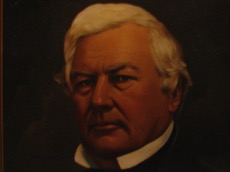
So to all my friends, I wish you a very happy Millard Fillmore Day.
God and the Superbowl
It was a short phrase uttered to a reporter by a Green Bay player in the wake of the game that reminded me of that: To God be the glory he said. Is it really possible? Can God be glorified by an overhyped football game played by overpaid players who think that dowsing their coach in Gatorade is a good thing to do? Strangely enough, it turns out that the answer to that question is yes.
A teaching colleague of mine a few years ago liked to remind us that every act was an act of worship. He is right. When we who love God use what God has given us to do whatever it is we do with excellence, God is pleased. (Remember last month’s “Whatever and the Web” blog?) I don’t think God would be particularly impressed if I suited up and tried to score a touchdown; my athletic ability is such that it would not be done with excellence, and my goal would more likely be survival rather than the glory of God. But when I use well the gifts He has given and offer the result to Him, He is delighted.
To God be the glory is not just a convenient phrase. It is a way of life. What a staggering privilege is ours to delight the heart of God - and He doesn’t care what uniform we’re wearing.
The Last Enemy
It began with a simple hand-addressed envelope from the mother of a California acquaintance. The envelope contained the memorial folder from her daughter’s funeral. I found and reread my friend’s Christmas letter (these annual epistles were the extent of our conversation) sent just a few weeks ago; there was no hint that death was around the corner of the new year. Then came the emailed news of a relative of Joan’s who had died after a painful experience of bone cancer. Her death was welcomed release. The same day came news of a former parishioner whose body is slowly giving up and who will likely be in the presence of the Lord within a week or two. Hard on the heels of that news came word of a friend just diagnosed with cancer.
The losses of others scrape against the scars of my own grief. Death, however it comes, is not to be feared, but it is undeniably the enemy. Death and disease leave pain in their wake. It was Paul who described death as the last enemy to be destroyed (1 Cor 15:26). The good news is that death has been defeated, the victory sealed with Easter’s empty tomb. One day, death will be destroyed as well.
The mail just arrived. I wonder if I should open it.
Whatever and the Web
I suppose it has something to do with the reluctance with which many Christians approach the cutting edge of technology, fearful that it may cut them. I understand that. I consciously avoided texting for several years until it dawned on me that I was missing out on another way to tell my family I loved them. I continue to avoid jumping on the Twitter bandwagon. Blame it on my age if you want; I was born just before the baby boom, and as one who straddles two worlds, I sometimes embrace technology the way I would embrace a porcupine.
I was amused (but not surprised) to discover today that a church I know has a page on facebook, placed there, I would guess, by one of its members. However, nobody knows the page is there, and it contains no information at all beyond the church’s name. Worse yet, the page boldly declares “0 people like this.” Not even the person who created the page? I’m pretty sure that’s not the message this group of believers wants to convey. (Okay, I know you want to go check to see if it’s YOUR church. Go ahead; I’ll wait....)
I am blessed when I come across a church web site that is thoughtfully designed and communicates clearly. It doesn’t happen often, but it does happen. I think the best church web site I have seen belongs to a little congregation of less than 50 people who don’t even have a building. But they know how to use contemporary technology to connect effectively. I used to wonder how (or if) Jesus would have used the web until I remembered that God created a web and called it the church.
Whatever you do - even technology? - do it all to the glory of God.
Sort of New
I’ve noticed these past few days how easily the new can slip back into the old. I try to visit my friend the treadmill several times a week. The first Monday of the year, the gym was as crowded as I’ve seen it. Lots of people showed up to fulfill the newness of their resolution. Fast forward one week and the crowd has disappeared. Most of the cardio equipment sits unused, and I have my choice of treadmills. Could that many of my fellow new-year-exercisers have suddenly discovered the proverbial road to hell that is paved with good intentions?
The trouble with hanging on to the new is letting go of the old. Some old stuff is worth keeping. The changing of a year should not erase valued friendships or happy memories. Last week I came across a folder of Matt’s with old annual evaluations in it that had me laughing at his humor and weeping at his tenderness. Neither the journey of loss nor the journey of joy is interrupted by the edges of January.
How much of the old can I hang on to while still grasping the new? How much of the new can I grasp without letting go of the old? Perhaps January is a time for discernment.
Happy sort-of-new year.
Who Cares?
I found myself thinking about pastoral Christmases while trying to find a late-night Christmas Eve service. It surprised me to discover how many churches have either no service or one only in the early evening. Before it became irritating, I remembered some of my own pastoral Christmas Eves where time with my own family was sacrificed for time with a congregation. We made that sacrifice willingly, joyfully and without resentment, but now I was glad for the pastors whose Christmas Eve schedule was a bit more relaxed.
They give a lot. And in our consumer-oriented culture, we take a lot (including, often, our pastors for granted) and we don’t much care. Perhaps we should. Your pastor doesn’t need much, but he could use your prayers and your encouragement. He could use them in January and February and beyond as well. This Christmas, how about giving the gift of caring for those who care for you?
The Tree and Me
It didn’t take us too long to find the perfect tree. It was a grand fir, the right height, attractive from every side, and pruned to a perfect shape. But it wasn’t calling loud enough. We noted its location and kept looking. Then we heard it; more accurately, Suzanne heard it first. It was a Fraser fir calling out to us. And it needed to be cut. It was encroaching on two adjacent baby frasers whose healthy growth would be threatened if it were not removed.

Tonight Suzanne is decorating the tree. No longer for sale, it is ours, it is beautiful (and becoming more so), and we are glad. It stands in our living room as a silent reminder of the miraculous grace of Christmas. I am less than perfect; I was marked for destruction; and God, who had his choice, chose me.
Thanks Giving
This Thanksgiving Day began with a phone call. I had officiated at her husband’s funeral two decades ago. I had tied the knot when she remarried. I had heard the stories of assorted family tragedies and walked through deep waters with her family whose waters seemed deeper than most. This morning she had called to tell me that her adult daughter had died early this morning. She asked me the obvious gut-wrenching question: Why did God take my daughter? I have asked the same question, but I cannot answer it. The only adequate answer to why is Who.
Her Thanksgiving Day had begun the same way my Fathers Day had ended, with news of the death of a child. How does one give thanks against the backdrop of such a loss? While the loss is raw and the pain is deep and the tears flow, can one give thanks? Sometimes thanks giving is easy, but not for her, not today. And yet the words are hers: We have so much to be thankful for. Such thanks are a costly gift, a gift that gives meaning to the phrase a sacrifice of praise.
I like Thanksgiving, and I like thanks giving. It is a time for counting blessings (as if they could be counted), and it is a time for counting losses. And it is a time to discover afresh the wonder that no matter how deep and painful the losses, they do not eclipse the thanks-prompting grace of God.
Remedial Trust

Which was strange, given that the Sunday sermon we had both heard focused on Jesus’ gentle reminder, do not worry. She remembered and reminded me: “Remember Dad, ‘do not worry.’” I didn’t remember, and my answer had only honesty on its side: “I think it’s too late for that.” I was already well into worry.
Eventually two words on the refrigerator caught my eye. They were placed there three years ago (we don’t edit our refrigerator door very often) during Joan’s irreversible decline. We had prayed for God’s will and ours; ours was healing. God’s consistent reply was the two words I had put on the refrigerator door: Trust Me. My response - I can trust God for healing - was significantly narrower than God’s invitation: Trust Me. Seeing the words again stopped me in my tracks and sent me back to Sunday’s text.
Do not worry. Trust me. Do not be afraid. There were no limits other than the ones my untrust had imposed. There are two problems with untrust. First, it obscures the character and unchanging love of God. And second, it is easily learned - and difficult to unlearn. I’m pretty sure that Suzanne, Katy, and Bob didn’t need a six hour Seattle ice adventure. But God being God didn’t waste it; He gave me a six-hour course in remedial trust.
I wish I hadn’t needed it.
The Electric Life
I was returning home last night from a Bible study, looking forward to enjoying late dinner, sending a couple of emails, and reading a few more chapters in the current library book. The house, however, looked a bit different as I approached it. It was dark. So was the street. And so were the other houses in the neighborhood. It turned out I was coming home to the first wind-whipped power outage of the season.
I have gotten used to the plugged-in life, and when the electricity ceases to flow, so do I. Late dinner options narrowed considerably: peanut butter? cold pizza? (I suppose I could try warming it over a candle.... Maybe not.) I was briefly grateful for my laptop’s fully charged battery until I realized that my modem required a power source. There was a time in my life when reading by flashlight or candlelight was a reasonable choice, but that time seems to have melted into my personal history. Almost everything I wanted to do required electricity. But it’s not all bad. There is a pleasant quietness to being disconnected. I was blessed by my daughter who had thoughtfully lighted my way with candles. And fortunately, prayer and sleep are possible without a plug.
Nine hours later the power is back on, and I am reconnected with the ordinary. I have a briefly freshened appreciation for power and a deepened desire to see the powers that be spend millions to underground the utilities for the sake of my convenience, but I am not hopeful that it will happen anytime soon. Or ever.
There will be more windstorms and more trees knocking out more power lines. There will be more days when I come home to darkness. It shouldn’t surprise me, but it will.
12 Words
I was wrong. I am sorry. Please forgive me. I love you. People have a hard time hearing the end if they haven’t heard the beginning. It strikes me today as I listen to the president’s response to yesterday’s election that what is so clearly true in human relationships is also true in the political realm. And I wonder about the power that might have been released if those twelve words had been included in today’s press conference.
Some of you read the title of this blog entry and hoped that I had finally learned to tweet, limiting myself to just a dozen words. I guess I misled you. I was wrong. I am sorry. Please forgive me. I love you.
Dino, Patty, and Jesus
It will be a while before we know whether Dino will replace Patty in the Senate. The vote counters will do their thing, and King County Elections will try to avoid yet another scandal. I just glad not to be getting calls from either campaign. It is axiomatic that politics and religion as conversation topics are bound to start an argument, and so for much of the year, civil people often seem to avoid those topics. Except, of course, during election season when it is fair game to urge everyone in sight (and thousands who aren’t in sight) to support the candidate or cause of one’s choosing.
Don’t get me wrong. I love the freedom we enjoy to engage in vigorous debate about politics, and I can be just as passionate about my views as others. Freedom is a precious thing. But I sometimes wonder if our passion is not misdirected. Maybe we need an election season for Jesus, a time when it is not politically incorrect to share one’s convictions and passionate support for the Lord. Maybe that season is now. Maybe it’s okay to risk disagreement.
I voted for Dino in spite of the woman who called three times to urge me to mail my ballot voting for Patty. If Dino loses, I’ll get by, and so, I hope, will the country. But I’m pretty sure I won’t make it without Jesus. And that’s worth a little passion.
Me and Monterey

I hadn’t been there for years, but I recognized the scene. The rugged, rocky, cypress-dotted coast of the Monterey Peninsula has a unique beauty and powerful appeal. Later that afternoon before boarding the train in Salinas, I needed to drop off the convertible that Enterprise had confused with the compact I had reserved, but for a little while last Tuesday, I just wanted to enjoy the view.
Some scenes can captivate for a few moments, and then one is content to move on. But watching the waves is different. Though there is a clear familiarity about the scene, it is constantly changing, this wave breaking differently than the last, water meeting rock with a surprising splash or a curious calm. Mysteriously, each moment has its own beauty and appeal.
I have been thinking about the focus of this season in my life, and I think that the continually changing interaction of sea and shore and cypress has something to tell me. The scene is recognizable, but it is not static. An infinitely creative God moves the components of my life, sometimes with a surprising splash, sometimes with a curious calm. And I hope that what he creates in the process has an ever-changing beauty.
Welcome to Mount Hermon

The conference is over now, and it is quiet here. Mount Hermon is again fulfilling its role as a personal retreat, a place to listen to God. Even for a retired guy, the busyness of life can easily drown out the quiet voice of the Lord, and listening is good. Listening, in fact, was one of the goals for this trip, and that goal is being met. These last three days of enjoying the worship, fellowship, and messages of the conference helped to sharpen my hearing as I enjoy some quiet hours with the Lord.
When they were kids, Matt and Suzanne used to watch eagerly for the “Welcome to Mount Hermon” sign on Conference Drive that told them we had arrived. The sign is still there, and I have sensed the welcome from the One who created the redwoods. It’s quiet, but He is here. And He is not silent.
Mussolini vs The Good Samaritan

Yesterday’s northbound Coast Starlight was having problems that even Mussolini couldn’t fix. With a malfunctioning locomotive, it was 100 miles into its journey and six hours behind schedule. So it was that somewhere north of Santa Barbara, we stopped to dissolve both the dream of an early arrival and the nightmare of a stalled train. Those in the know disconnected one of our two locomotives, turned it around on a convenient Y, and hooked it up to the front of the stalled northbound train. A sacrificed hour later, both trains were on their way.
It would be a happy ending were it not for the muttered grumbles of a few passengers fretting over the possibility that they might miss a connecting train in Los Angeles. It seems to me that in the eternal scheme of things, an hour spent parked by the Pacific to help those more inconvenienced than me is not a bad thing. But there is this streak of selfishness that slithers through the soul, trying to convince us of our own importance. The next time I’m tempted to pass by a neighbor in need, someone needs to remind me of yesterday’s Coast Starlight and that not even Mussolini made the trains run on time.
Journeys Are Good
The journey is good, but getting ready for it is an irritating hassle. I hate packing. Anyone in my family can confirm that truth. Joan did the packing when we traveled, and now every trip is a reason to miss her afresh. I’m pretty sure I have packed too much stuff; I usually do. I’m also pretty sure I have left behind something I should have brought along; I usually do that, too. And before you ask, yes, I have a list, but I’m pretty sure it’s too long. I may have brought the wrong stuff, but fortunately Amtrak doesn’t charge me for baggage.
I like train travel. It avoids the hurry-up-and-wait, TSA-bedeviled atmosphere of today’s air travel and allows one time to reflect on and enjoy the journey. And I intend that this trip include time to reflect on my journey. Grief has a way of occupying the mind and narrowing one’s vision, and I need to be sure that my focus is neither too narrow nor misplaced. So I bring along the pieces of my life to listen to God; I hope I have not packed too much, but He doesn’t charge me for baggage.
I am on a journey, and journeys are good. In the world of Malcolm, change can come slowly.
Some Sheep are Stupid
It strikes me that the challenging privilege of a shepherd is to love some truly stupid sheep. I used to believe the lie that when an unwise and intellectually challenged pagan became a Christian, somehow God made them smarter. Usually it is not so. When a stupid pagan becomes a Christian, it is a wonderful thing, but the result most often is a stupid Christian with an acute but sometimes unrecognized need to rely on the Holy Spirit. And those who shepherd such sheep get to love them through all of their messy stupidity.
Sometimes it is a challenge. I never cease to be amazed at how blissfully unaware some folk can be of the damage they stupidly leave in their wake. I was reminded of that again recently in talking to a man who remains clueless about his own self-created chaos. It seems to me that the Christian life lived in a sinful world can be messy enough without other Christians making it messier.
Pastors, of course, are not perfect. I remember several years ago being part of a group that invited our district superintendent to speak to district pastors and wives on the topic, “Don’t Be Stupid.” It was a tongue-in-cheek suggestion, but he took it seriously, and I suppose it is a message all of us need to hear.
The hope in this picture is that stupidity carries with it the potential to understand and experience grace. And I suppose that the stupider we are, the deeper the grace. To be stupid and miss grace is tragic indeed!
It occurs to me that some who read this will wonder if it was prompted by a conversation with their pastor. Don’t go there. Some sheep are, at least occasionally, stupid, and you might be one of them. So might I. If you feel the need to ask, then do something to correct the stupidity and bask in the grace of your Shepherd and your shepherd.
The Chaos of In Between

It turns out that it is impossible to replace carpeting that has stuff on it. We have much stuff, and since the law of gravity has not been repealed, a lot of the stuff is on the carpet. Or was. And it had to be moved; at least that’s what Rob the carpet-layer said. I take him at his word since he and his son moved most of the heavy stuff. But it’s the little stuff that makes me wonder. What is this? Why did I keep this? Remember when...?
I have a fearsome tendency to packrat-ism, and I am not alone. Getting rid of stuff is time-consuming work, and I have better things to do. Besides the disease has almost no symptoms - until it comes time to replace the carpets. Lumpy rugs are no good; the stuff needs to be moved.
I live in between, and stuff is a link to what was, but it crowds the corners of my life that could be occupied with better things. Stuff is for in between, and in between is not forever. Most stuff eventually becomes burdensome; Thoreau (great writer, lousy theologian) rightly observed that men have become the tools of their tools, an observation that is even more true in the 21st century than it was in the 19th. In between living carries with it the promise of a destination, and I will make it to heaven without my stuff and without missing it. Neither Joan nor Matt miss the stuff I hang on to. But I still live in the midst of this in between stuff, some of which, at least while I’m in between, is good. It takes wisdom to know what to release, and when. For better or worse, when Rob and his son are done later today, most of my stuff will still be here.
I live in the chaos of in between. But only for a while.
Grief vs Grief
There are, I suppose, some evident generic differences between those two kinds of loss. When one deals with the visible decline in the health of a loved one, grief begins before death because loss begins before death. However, stretching grief beyond the boundaries of death doesn’t necessarily make it shorter or shallower. On the other hand, the added element of shock when the death of a loved one is completely unexpected can be both a blessing of sorts and a curse as it provides both a degree of temporary anesthesia as well as an additional source of pain. But the reality of the loss and the challenge of adjustment remain. And when it is a son or daughter that has died, the loss is particularly painful.
For a couple of reasons I have difficulty answering the question. While generalizations are possible, it seems to me that grief is an intensely individual experience. Because of that, my grief journey and that of someone else who is experiencing almost identical circumstances may be markedly different. And those individual differences can be greater than the generic differences that could be noted between different kinds of loss. Those who do not recognize this truth are prone to place expectations on those who grieve and then wonder why those expectations are not met. (S)he should get over it or (s)he is handling that well can be equally inaccurate assumptions.
Additionally, I recognize that I am in the midst of processing these losses. I cannot be wholly objective in describing the journey; I can only be honest. Were objectivity possible, I’m not sure it would be either interesting or helpful. To describe the journey while one is in the maze of grief may be interesting to those outside the maze, but their own experience may be quite different. And so I am less concerned with telling others exactly where to turn left or right than with suggesting who it is they need to follow. The constant that makes joy possible in either kind of grief is knowing the unchanging, loving God of the maze. I cannot fathom how painful it must be for those who try to navigate grief, whatever kind it is, alone.
Glenn Beck and a Donkey

But for this Christian, the rhetoric was interesting. I take pleasure in hearing a powerful call for Americans to return to God. That the source of that call was a self-avowed Mormon nudges me to figure out what to make of that. Most Mormons I know consider themselves Christians; most Christians I know consider Mormons non-Christians. So I am left with a question: Is it possible for a Mormon to incite genuine spiritual renewal among Christians?
It’s a question worth asking. And it reminds me of the Old Testament’s most famous donkey. Balaam’s ass was not only not one of the chosen people, it wasn’t a person at all. Yet it became an instrument of God and spokes-beast (seems more appropriate than spokesperson) for God in moving its ungodly master to act for God. God, after all, wastes nothing, not even a donkey. So I suspect that He won’t waste Saturday’s rally either. What do you think?
The Other Johnny

We were not friends. We traveled in different circles and had different interests. He was a greaser who must have gone through a bottle of hair oil every week. The large economy size. He obviously took issue with Brylcreem’s claim that “a little dab’ll do ya.” The jingle went on to say, “The gals will all pursue ya; they’ll love to run their fingers through your hair.” Johnny obviously figured that a big dab of the stuff would attract even more gals. He was not what I would call an academic success. As I remember, he gained the distinction of being named the student least likely to succeed.
That, of course, is the trouble with drawing conclusions too soon. Making final judgments before things are final is dangerous business. The reason I ran across Johnny’s name the other day is that he has become one of the richest men in America. He ultimately turned what some of us regarded as a hair fetish into a wildly successful business developing and marketing Paul Mitchell hair products. (Would anyone have bought Johnny DeJoria hair products??)
I thought of the other Johnny again this morning as I had breakfast with a friend who reminded me that the fruit of Matt’s ministry would continue to blossom in the years ahead. He is right. I doubt if any of the kids with whom Matt worked will become as financially rich as the other Johnny, but I’m blessed to have seen and heard already the evidence of growing spiritual riches in young lives. And I’m reminded of how foolish it is to hang a loser label on those the Lord loves before He is done.
Getting There

There was time in my life when the journey was as good as the destination, particularly if it involved traveling. When I was a kid, I mastered public transportation not so much to go somewhere as for the joy of the journey; where was almost irrelevant. But now four hour drives are less fun than they used to be. The body gets stiff and the bladder gets full. There (wherever there might be) has become more important that getting there.
I’m not sure that that is all good. The destination is important; Paul had something to say about that (I press on toward the goal....) But the journey is also valuable. And this journey had some wonderful moments. Because the Christian life is a relationship with Christ, whatever I experience on the journey I experience with Him. And in the process of the journey, before I arrive, I get to know Him better.
It is a reality that is important as I walk through the adjustments of grief. Matt is there and so is Joan. Suzanne and I are still getting. While it may occasionally be difficult, the journey is marked by joy.
Drawing Near
I’m not talking here about the kind of recreational misdirection that can inject some unexpected fun into life. I am occasionally guilty of that kind of phoniness. The other day, for example, I called up a friend who was seeking new tenants, disguised my voice, and pretended to be something that I am not: I need to rent a condo, but I don’t have no money. I could pay you with food stamps. I don’t need food; I can shoot squirrels and other small animals to barbecue. Are there dogs and cats in the neighborhood? You get the drift. It was an interesting conversation, but after a couple of minutes, I had to tell the truth: It’s Malcolm, and I’m messing with your mind.
A couple of minutes of phony might be tolerable. A lifetime of phony is tragic. One of the characteristics of my family for which I am thankful is a lack of phoniness. I was reminded of that again sorting through some of Matt’s old papers. He had the family wysiwyg characteristic; what you see is what you get. And I was reminded of it again in Hebrews 10: Let us draw near with sincere hearts.
One simply cannot draw near to God while being a phony. I am what I am and He knows it and loves me anyway. His character demands that the masks come off, and his grace gently sees through them. I don’t understand people who try to develop a relationship with God while practicing phoniness. The reality of drawing near is much too good to settle for less.
Matt's Testimony
About a week ago I was surprised and blessed to come across a written version of the testimony Matt shared in Hong Kong. He had kept it along with a longer (and later) outline version of his testimony that focused on God’s grace. Twenty-four Chinese students were present. That night six of them indicated they were making a first-time commitment to Jesus Christ; another twelve indicated some other significant spiritual decision. The simple truth from transparent lives makes a powerful impact. There is for me something wonderful about hearing his testimony again, as it were, from heaven. Here is what Matt shared sixteen years ago with students in Hong Kong, and, by the grace of God, with me again last week:
Tonight you have learned a lot about the foreign tutors. I would also like to talk to you.
In high school and at university, I worked on a school newspaper writing stories about politicians, professional athletes, and university officials. Like last night, I would sit and talk with them to learn more about these important people.
Many years ago before I worked on the newspapers, I met someone who was more important than any other famous person I have talked to. His name is Jesus, and he changed my life. When I was younger, two men came to my church and shared about God. They told me that God loves me, but that I was separated from him by sin - doing things that are not right. There was a gap between God and myself. Jesus is the way to cross that gap. Jesus said, “I am the way, the truth, and the life; no one can go to the Father except by me.”
That night I invited Jesus into my life, and that changed me forever. Now when someone asks me if I have ever talked to or written about an important person, I say, “Yes – his name is Jesus, and he changed my life.”
The Mountain

I was reminded of both its impressive beauty and its constancy listening to an old Dottie Rambo song that asks the question, Where do I go when the storms of life are threatening? The faith-affirming answer in the title of the song says I go to the rock of my salvation, I go to the stone that the builders rejected; I run to the mountain, and the mountain stands by me. When the earth all around me is sinking sand, on Christ the solid Rock I stand....
When it’s stormy around here (which it isn’t today), the mountain may seem to go into hiding, but it is there whether I see it or not. And if I get close enough, I’ll see it. The mountain is out, and I’m going to the Rock.
I Go the the Rock
Hidden Treasures

As we were walking by, we caught a glimpse of what looked like an old fire engine through the windows in the doors. We peered through the window and discovered it was one of several vintage fire engines inside. We eventually found a door (locked) that identified the Last Resort Fire Department, a Seattle Fire Department museum that opens for a few hours on Wednesdays and Thursdays. It was Monday, and we were out of luck. Or so we thought until a fire department official took pity on us and graciously offered to let us in for a private viewing. It is a fascinating display and an unexpected blessing.
Hidden treasures like the Last Resort Fire Department seem an appropriate metaphor for the last several days as we marked Matt’s passing with a graveside service and a barbecue. I have been blessed to hear wonderful stories of Matt’s impact. Some have brought laughter, some have brought tears; all have brought joy and made me hungry to hear more. Like a gracious fire department official who got out of his vehicle and unlocked a door, friends have opened their memories and let me in to see hidden Matt treasures worth sharing. Thank you!
Mysteries

For example, I don’t understand how it is that I can miss so deeply and constantly someone whom I only saw for a few weeks each year. Thirty months ago when Joan passed away, I was suddenly separated from someone with whom I had shared everything; the depth of loss was no mystery. But for the last decade, Matt has lived and ministered almost a thousand miles away. We were, at least theoretically, independent. Email and cell phones made communication easy, but days often passed without our talking or needing to. It makes no rational sense that I should miss him constantly. Love, of course, is not moderated by miles or contained by reason; still, it is a mystery that I experience without needing to understand.
The seemingly oxymoronic coexistence of sorrow and joy in our lives these days is another mystery. This one I think I can explain - at least I have tried on other occasions to explain it. But even though I know that both sorrow and joy are appropriate, sorrow because of loss and joy because of my relationship with Christ, their coexistence feels counterintuitive. It is a mystery in which I live.
I am exploring yet another mystery. Paul expresses his desire to know Christ and the power of his resurrection and fellowship of his sufferings. It seems to me that there is a mysterious connection between experiencing loss and knowing God. Perhaps it is simply a reflection of a loving God’s unwillingness to waste anything in my life; however, that grief should become a catalyst for growth is a mystery that I’m not sure I like.
Small People
There are way too many times in my life that I feel small and insignificant. A mere speck in the grand scheme of things, with no reason as to why I’m here, or what mark, if any, I’ll leave.
But whenever these feelings overpower me I try to remember
one of my favorite bible characters, Zacchaeus.
As the story goes this little man, Zacchaeus,
who had made himself into more than he really was,
was eager to see Jesus as he rode into Jericho.
So eager that he climbed up into a tree for a better look.
While this may have given him a birds eye view,
it probably actually hid him from Jesus as he passed.
And here’s the part of the story that I really like,
Jesus sees him,
knows who he is,
calls him by name,
and wants him
to have dinner with him.
This just blows me away every time I think of it.
So much so that
I have that phrase in the back cover of my favorite bible,
And every time I’m down (way too often),
I just flip to the back and see…
HE SEES ME,
HE KNOWS ME,
HE CALLS ME,
HE WANTS ME!
It’s great to be loved
by the one who taught us
all about it.
God doesn’t have to tell me He cares about the small people. When I think I’m small, He gently corrects me with His love. And there is indeed nothing like being loved by the God of the universe who doesn’t think you are small!![]()
Hands
God is worthy of whatever worship I can give Him, and my fellow-worshipers help me handle the handicap of grief. It was not just handshakes and hugs before and after the service, it was hands during the service as well. Amazing grace... my heart was too full to sing aloud, and my leaking eyes were closed in prayer when I felt the hands of others on my shoulders. I’ll take your burden, you take My grace... There are times when I need to be alone; this morning was not one of them. Their hands said what my heart needed to hear.
It is of grace that God should delight in what broken worshipers can offer. This morning, this broken worshiper was blessed to be helped by the hands of others.
I Know...

I know Matt is now freer than he has ever been. I know his wonder at God’s grace is growing in God’s presence. I know his pastoral heart that wept with those who weep is weeping no more. I know that his outrageous sense of humor has blossomed into unfettered joy. I know that his Redeemer and mine lives. I know that the Lord he loves has welcomed him home.
And I know that what I know, and what I don’t know, doesn’t erase the pain now that will become joy then.
Because He's Worth It
Lots of people have given up on church. They used to go, but they discovered their church was less than perfect - sometimes a lot less. I understand that. I have been in a lot of imperfect churches and even pastored a couple of them. People do stupid things. They become consumed with the organization; they treat it like a club; God gets lost; people get hurt and leave and don’t come back.
I’ve seen all of that, but I’m still a habitual church attender, and in this morning’s drizzle I pondered why. I love the people, but it is more than social need that keeps the habit alive. The relationship with Christ that began six decades ago gets fed when I worship, and worship is best done in community. Simply stated, I am doing this because He is worth it.
A Happy Birthday

I continue to enjoy living out the discovery that sorrow and joy are not mutually exclusive. It is a good thing to be able to experience the reality of loss without letting go of the joy and the hope that are an integral part of a relationship with Christ. I’m pretty sure Joan is joyfully celebrating today as well, but I don’t think her birthday has much to do with it.
Would Thoreau have used a cell phone?
Men have become the tools of their tools.

I Wonder Where It Went
So I’m starting over beginning with yesterday’s entry that I managed to save. Starting over is good, and it is a reminder that there is still grace in my world.
Perhaps there’s something to be said for paper after all.
Sometimes It's Spring
